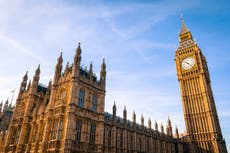Marcus Rashford is fantastic, but no amount of food charity will end child poverty in the UK
Children in Crisis: While scientists are still working out the best way to tackle the Covid-19 pandemic, we know what to do to reduce child poverty in the UK – we’ve done it before and we can do it again
Your support helps us to tell the story
From reproductive rights to climate change to Big Tech, The Independent is on the ground when the story is developing. Whether it's investigating the financials of Elon Musk's pro-Trump PAC or producing our latest documentary, 'The A Word', which shines a light on the American women fighting for reproductive rights, we know how important it is to parse out the facts from the messaging.
At such a critical moment in US history, we need reporters on the ground. Your donation allows us to keep sending journalists to speak to both sides of the story.
The Independent is trusted by Americans across the entire political spectrum. And unlike many other quality news outlets, we choose not to lock Americans out of our reporting and analysis with paywalls. We believe quality journalism should be available to everyone, paid for by those who can afford it.
Your support makes all the difference.Quite rightly, Marcus Rashford has become a national hero for demanding a response to child poverty. He has been able to articulate the lived reality of hunger for a child – one of the many symptoms of child poverty. But the uncomfortable truth is that a U-turn to address child hunger gets us nowhere nearer to finding solutions to child poverty.
As Covid-19 struck, we already had a child poverty crisis – the other epidemic the UK faces. There are 600,000 more children in poverty today than back in 2012. It has risen for perfectly understandable reasons. The majority of kids in poverty (72 per cent) live with working parents who can no longer make ends meet. It is these mostly working families who rely on state top-ups to be able to manage. Yet these supports have been under sustained assault with more than 50 cuts since 2011, mostly falling on the benefits that families rely on – child benefit, tax credits, housing benefit and universal credit.
Child benefit alone has lost more than 23 per cent of its value since then. This year we were on track to spend £36bn a year less on social security than we did back in 2010. The cutting stopped this year with the first benefit uprating for years and, of course, more was spent in response to the pandemic, yet the child poverty this has caused goes on rising. There is no shortage of food, just a shortage of money.
And the effects of child poverty are life long. Low income is causally related to poorer educational outcomes, poorer physical and mental health and low self-esteem. In the most deprived areas of our country, boys can expect to live 19 fewer years of their lives in “good” health and girls 20 fewer years than children in the least deprived areas.
And of course the harshest impact of the pandemic has fallen on the 4.2 million UK children who were already in poverty before the pandemic – usually because their parents are low paid and/or in insecure work, on zero hour contracts, or don’t have enough working hours to bring home a wage that will cover the family’s needs. While better off people in secure employment were reportedly able to save money during lockdown, families already struggling were pulled deeper into poverty.
While scientists are still working out the best way to tackle the Covid-19 pandemic, we know what to do to reduce child poverty in the UK – we’ve done it before. We need a comprehensive, cross-departmental strategy – when we had one in the UK between 1998 and 2008, child poverty was reduced by more than one million. Other countries learned from this and adopted targets of their own, including New Zealand, Canada, Ireland and Scotland. So we can do it again. Action is needed across the whole of government with clear leadership from 10 Downing Street and targets, including a focus on children most at risk – black and minority ethnic children, children in disadvantaged regions of the UK, children in one parent families, disabled, homeless and refugee children.
Now, as we pull out of the immediate impact of Covid-19 and start to rebuild the economy, we need a strategic approach to tackling child poverty that recognises the depth and scale of the problem. If we don’t recognise and understand the problem, we can’t even begin to put in place a plan to address it – and this plan is as necessary now as the plans that helped limit the impact of the pandemic.
The plan should include strengthened social security, decent work, pay and progression, paying attention to racial discrimination, the gender pay gap, the needs of second earners, better employment support and parental leave. We need universal childcare, including extended schools, universal free school meals, secure homes and high-quality universal services such as children’s centres, youth services, advice and support. This is what building back better looks like.
As a first step, we urgently need to pump prime support for all children to make sure none are falling between the gaps. The most efficient way of doing this is through increased investment in child benefit to reach every child. Adding an extra £10 per week per child now would reduce child poverty by 5 percentage points. This would also benefit families above the poverty line whose finances have been shocked by Covid-19 by providing a small income platform to prevent them from falling into poverty.
To ensure that all children do gain from this, the government must also remove the benefit cap – the rationale for which (to get more parents into work) has become obsolete and immoral as the jobs market has shrunk – and the cruel two-child limit that targets cuts on babies and toddlers, ignoring the needs of third and subsequent children, mostly in working families.
In recent times an army of amazing people has stepped in to help struggling families and the number of food banks has grown as the increase in benefit cuts rolled out. Marcus Rashford has done a fantastic job in galvanising the concern about child poverty that’s visible for all to see. But as Marcus has said, food aid is a sticking plaster. The truth is that no amount of food charity is going to end child poverty. Yet, unbelievably, there is no government strategy for addressing the problem.
No targets or milestones to work towards. While we can all welcome steps to address the immediate crisis and improve support for families in the holidays, it’s time to tackle child poverty with a plan to improve family incomes and remove the need for food aid entirely.
Alison Garnham is chief executive of Child Poverty Action Group




Join our commenting forum
Join thought-provoking conversations, follow other Independent readers and see their replies
Comments